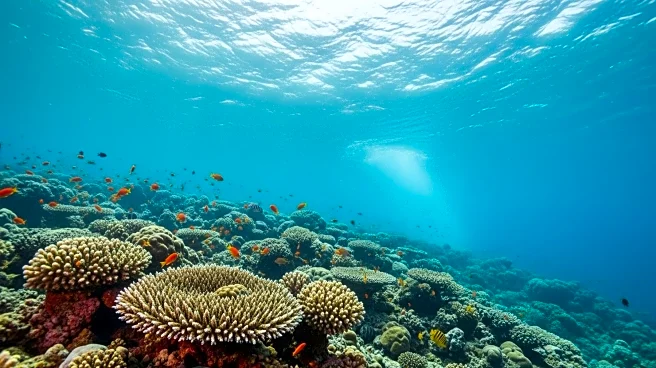What's Happening?
Recent studies have highlighted the impact of marine heat waves on the ocean's ability to sequester carbon, a crucial process for climate regulation. Phytoplankton and zooplankton, key players in this process, are affected by rising ocean temperatures, which have been exacerbated by human-induced climate change. The northeastern Pacific Ocean experienced significant heat waves between 2013-2015 and 2019-2020, altering the composition of these organisms and hindering the downward transport of carbon. This disruption poses a threat to the ocean's role in capturing a quarter of humanity's CO2 emissions, as the heat waves prevent carbon from sinking to the depths, where it would be locked away from the atmosphere.
Why It's Important?
The ocean's ability to sequester carbon is vital for maintaining global climate stability. Disruptions in this process could lead to increased atmospheric CO2 levels, further accelerating climate change. The changes in phytoplankton and zooplankton populations not only affect carbon sequestration but also impact marine ecosystems, which rely on these organisms for food and oxygen production. As marine heat waves become more frequent and intense, the ocean's capacity to regulate climate and support marine life is compromised, highlighting the urgent need for reducing greenhouse gas emissions to mitigate these effects.
What's Next?
Scientists are monitoring marine heat waves globally to understand their impact on oceanic carbon sequestration. The use of Biogeochemical Argo floats provides valuable data on ocean chemistry, helping researchers assess the extent of these disruptions. Continued observation and research are essential to develop strategies for mitigating the effects of climate change on marine ecosystems. Policymakers and environmental organizations may need to prioritize actions that address the root causes of climate change, such as reducing emissions and promoting sustainable practices.
Beyond the Headlines
The disruption of carbon sequestration in the ocean has broader implications for marine biodiversity and food security. As phytoplankton populations decline, the entire marine food web is affected, potentially leading to reduced fish stocks and impacting communities that rely on fishing for their livelihoods. Additionally, the ocean's role in oxygen production is compromised, which could have long-term effects on air quality and human health. Understanding these interconnected issues is crucial for developing comprehensive climate policies that address both environmental and societal challenges.









